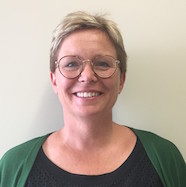Silke Morrison's PhD studies are helping to determine how being tired might influence our diet, and in particular, why we eat when we are not hungry. Silke brings an array of healthcare experience to the research environment, as well as a great work ethic.
The DREAM study
Observational research has shown us that children who don't get enough sleep are at higher risk of obesity. But we don't know why this is. DREAM is an intervention study looking at how sleep impacts diet, physical activity and screen time in 8-12 year old Dunedin children.
Silke is investigating whether mild sleep deprivation in children increases their desire to eat unhealthy foods. Children are asked to go to bed one hour earlier every night for a week, and then one hour later every night for a week. At the end of each week the child visits the clinic for an eating experiment, to explore if the child eats more when they are tired or well slept.
Wearable cameras and accelerometers are used to observe the children's behaviour, so Silke and her colleagues can see exactly what the child eats and how they move throughout the day. It is hoped that this research will give the evidence needed to support sleep as a potential strategy for reducing childhood obesity in New Zealand.
A background in healthcare
Silke originally trained as a nurse and worked in pediatrics, including offering respite care for children in need. A chance encounter with a dietitian, as part of her professional desire to further assist her patients, inspired her to study dietetics.
As a dietitian, Silke mainly worked with adults, but always discussed with her patients the importance of sleep. She is excited about the opportunity to combine all of her interests in her doctoral research.
Looking to the future
Silke grew up in Germany on a farm and tree nursery. She helped on the farm by growing vegetables, picking fruit, driving the tractor, as well as cooking and preserving food. Her family is not surprised by her career choices, as Silke was always looking after others and loved working with kids.
In the future, Silke hopes to have the opportunity to combine research with teaching dietetics, and to continue her clinical work. Outside of her research, Silke loves being in the water, biking, gardening and, encouraged by her own children, is developing an appreciation of football.

